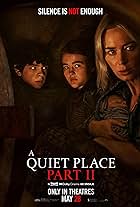Welcome to the new profile
We're still working on updating some profile features. To see the badges, ratings breakdowns, and polls for this profile, please go to the previous version.
Ratings11K
princebansal1982's rating
Reviews113
princebansal1982's rating
Another Coline Serreau film with Vincent London. Similar to previous two I have seen, this one also has a surrealistic bent.
It tries to show a mirror to our society And the reflection that we see is not pretty.
While I liked this film, I was not blown over by it as I was Chaos and "La Belle Verte". Both of them by same director and both a little surrealistic in nature. Maybe I was not in mood for the film and I may have to watch it again.
Still it is a good film. And Vincent London has done a fine job as always.
It tries to show a mirror to our society And the reflection that we see is not pretty.
While I liked this film, I was not blown over by it as I was Chaos and "La Belle Verte". Both of them by same director and both a little surrealistic in nature. Maybe I was not in mood for the film and I may have to watch it again.
Still it is a good film. And Vincent London has done a fine job as always.
Childhood Days is a very realistic portrayal of bullying. And by realistic I mean that both the bully and the bullied are shown to very human instead of being good or bad. It is very refreshing for a change and also it suddenly dawned on me, how incomplete and even wrong a narrative is if you are showing a bullying preteen to be evil as most films related to this topic often do.
I guess we are used to watching fights between good and evil in all our media whether it is fairy tales, television, books, films or even religion. There has to be a protagonist and an antagonist. Thankfully Childhood Days is different in that regard.
Childhood Days depicts the problem of bullying faced by a city kid who has to temporarily move to village. But the relationship between the two boys, the bully and the bullied is very hard to pin down. There is a camaraderie mixed with fear and admiration with a sort of helplessness. It is a very real relationship which is hard to describe, just as many real relationships are. Also along with the bullying it is a very nice coming of age story.
I know that the above review may not make the film sound really good. Nevertheless it is really a gem of a film. And if you are into films of Ozu or Naruse, I would strongly recommend it.
I guess we are used to watching fights between good and evil in all our media whether it is fairy tales, television, books, films or even religion. There has to be a protagonist and an antagonist. Thankfully Childhood Days is different in that regard.
Childhood Days depicts the problem of bullying faced by a city kid who has to temporarily move to village. But the relationship between the two boys, the bully and the bullied is very hard to pin down. There is a camaraderie mixed with fear and admiration with a sort of helplessness. It is a very real relationship which is hard to describe, just as many real relationships are. Also along with the bullying it is a very nice coming of age story.
I know that the above review may not make the film sound really good. Nevertheless it is really a gem of a film. And if you are into films of Ozu or Naruse, I would strongly recommend it.
All the world's a stage, And all the men and women merely players. - Shakespeare.
To really understand the above statement you have to actually see the instances when the players refuse to play their parts, even if momentarily. Renoir did it in "La Règle du jeu". People playing different roles - master and servant, husband and lover, poacher and grounds-keeper, break for their roles and connect with each other. It is one of the most beautiful movies ever made and has been in AFI Top 10 since it was released.
Faces is the anti-thesis of "La Règle du jeu". Here to the player stop playing their parts but instead of connecting with each other, they distance themselves from each other. So we have husband and wife, married woman and a gigolo, married man and a prostitute, all breaking their roles but to distance themselves even more from each other. In process they reveal how the very roles are a sham, that we just play out of habit, convenience and society. It challenges our very lives.
Of course, this makes for a very nasty picture but with incredible moments of truth. It is very honest and very depressing and a very hard watch while still being fascinating. Its the kind of picture that you appreciate more than you enjoy.
To really understand the above statement you have to actually see the instances when the players refuse to play their parts, even if momentarily. Renoir did it in "La Règle du jeu". People playing different roles - master and servant, husband and lover, poacher and grounds-keeper, break for their roles and connect with each other. It is one of the most beautiful movies ever made and has been in AFI Top 10 since it was released.
Faces is the anti-thesis of "La Règle du jeu". Here to the player stop playing their parts but instead of connecting with each other, they distance themselves from each other. So we have husband and wife, married woman and a gigolo, married man and a prostitute, all breaking their roles but to distance themselves even more from each other. In process they reveal how the very roles are a sham, that we just play out of habit, convenience and society. It challenges our very lives.
Of course, this makes for a very nasty picture but with incredible moments of truth. It is very honest and very depressing and a very hard watch while still being fascinating. Its the kind of picture that you appreciate more than you enjoy.


























